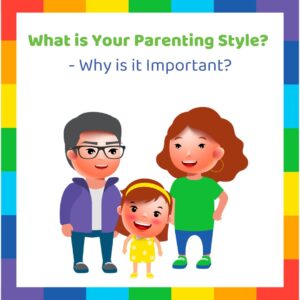
Parenting Tips
What is Your Parenting Style? – Why is it Important?
March 5, 2024
Related
Topics

Hey
-

-

Green Parenting: How to Make Your Home More Eco-Friendly?
April 24, 2025
-

How Can Parents Prepare for a Second Child? Simple Guide 101
March 28, 2025
-

-

Mindful Parenting: How to Reap the Benefits?
January 14, 2025
Ready for more?
Hey
Sign up for Rainbow Kiddies newsletters for more stories and updates
Let us explore what might be the most effective parenting style that has been defined, well-understood and researched.
Parenting is a journey that comes with its own set of challenges and rewards. The style of parenting you choose can significantly impact your child’s development, shape their personality, behavior, and overall well-being. While there is no one-size-fits-all approach to parenting, understanding the various styles can help you identify which methods may lead to healthier outcomes for your children. This article explores the best and worst parenting styles, drawing on insights from child development experts and psychological research to offer guidance for parents seeking the most effective approach.

What are the Effective Parenting Styles?
Depending on the degree of permissiveness, behavioral control and psychological control, parenting styles can be categorized as authoritative, authoritarian, permissive (indulgent) and neglectful (uninvolved).
 Authoritative Parenting (the most effective parenting style)
Authoritative Parenting (the most effective parenting style)
Widely regarded as the most effective parenting style, authoritative parenting combines warmth and nurturing with clear boundaries and expectations. Authoritative parents are responsive to their children’s emotional needs while also setting high standards for behavior. They use positive discipline strategies to enforce rules, explaining the reasoning behind their decisions to foster understanding and cooperation.
- Key Characteristics: High responsiveness, reasonable expectations, clear communication, and positive discipline.
- Benefits: Research shows that children raised by authoritative parents tend to have better social skills, higher self-esteem, and better academic performance. They are also more likely to develop good coping skills and exhibit less behavior problems.
Having trouble balancing workplace and kids? – Read our article on how to manage stress and make life easier for them and you.
 Authoritarian Parenting
Authoritarian Parenting
Often confused with authoritative parenting due to their similar names, authoritarian parenting is characterized by high demands but low responsiveness. Authoritarian parents enforce strict rules and expect obedience without question, often resorting to punitive discipline strategies. Further, there is little room for dialogue or negotiation, and the emotional needs of the child may be neglected.
- Key Characteristics: High demands, low responsiveness, strict rules, and punitive discipline.
- Drawbacks: Children raised by authoritarian parents may obey while young but can develop issues like low self-esteem, poor social skills, and increased aggression or anxiety. They may also struggle with independence and decision-making in adulthood, and even end up becoming authoritarian parents themselves.
 Permissive or Indulgent Parenting
Permissive or Indulgent Parenting
Permissive parents are highly responsive to their children’s needs and desires but set few boundaries or rules. They are often lenient and may avoid confrontation. Also discipline is rare, and when it occurs, it may not be consistent.
- Key Characteristics: High responsiveness, low expectations, leniency, and lack of consistent discipline.
- Drawbacks: Children of permissive parents may struggle with self-regulation and social responsibility. They might also exhibit more behavioral problems and perform less well academically. Additionally, they may have difficulty with authority and rules outside the home. They tend to feel entitled to such an extent that they will be more keen about taking rather than giving, when it comes to being in relationships.
- Benefits: These children might be more creative.
 Neglectful or Uninvolved Parenting
Neglectful or Uninvolved Parenting
Neglectful or uninvolved parenting is characterized by a lack of responsiveness to a child’s needs. Parents may be physically present but emotionally absent. Further, they provide little supervision, guidance, or emotional support.
- Key Characteristics: Low responsiveness, low demands, lack of supervision, and emotional detachment.
- Drawbacks: Children raised in neglectful environments may experience issues with attachment, low self-esteem, impaired social skills, and academic challenges. They are at a higher risk for substance abuse and other risky behaviors. Additionally, they might struggle with self-control and be unable to follow rules outside the home as well.
Why & How to Adopt the Most Effective Parenting Style?
There could be several factors to state here. I am stating only the most important ones to keep it simple and short.
- As per a published research, children who are looked after by caregivers who exercise strict psychological control might grow up to be vulnerable to emotionally abusive partners, employers, and so on. This could be offset to some extent if the child experiences emotional warmth with one of the caregivers.
- To understand what your style might be and what that might actually sound or feel like, see the questionnaire towards the middle of this article. Hope this helps to understand your parenting style better and also helps you make the necessary changes or improvements.
Conclusion
Understanding the impact of different parenting styles can empower parents to make informed decisions that nurture their child’s growth and development. The authoritative parenting style is generally considered the most beneficial, promoting a balanced approach to discipline and emotional support. Conversely, authoritarian, permissive, and neglectful styles tend to have more negative outcomes, affecting children’s social, emotional, and academic development. By striving towards an authoritative approach, parents can provide their children with a solid foundation for success and well-being.
In navigating the complexities of parenting, it’s essential to remember that perfection is unattainable, and flexibility can be key. What works for one child may not work for another, and parents must adapt their strategies to meet the unique needs of their family. Seeking support and guidance from child development experts and educational institutions might be helpful too in certain cases.
Happy parenting folks!
References
Baumrind, D. (1991). The influence of parenting style on adolescent competence and substance use. Journal of Early Adolescence, 11(1), 56-95.
Psychology Today | What Parenting Styles Set Kids Up for Emotional Abuse?
Baumrind, D. (1966). Effects of authoritative parental control on child behavior, Child Development, 37(4), 887-907.
Psychology Today | What Kind of Parent Are You? Take the Parental Analytical Style Scale!
Maccoby, E.E., & Martin, J.A. (1983). Socialization in the context of the family: Parent-child interaction. In P.H. Mussen (Series Ed.) & E.M. Hetherington (Vol. Ed.), Handbook of Child Psychology: Vol. 4. Socialization, personality, and social development (4th ed., pp. 1-101). Wiley.
Psychology Today | Parenting Styles
Steinberg, L., Lamborn, S.D., Darling, N., Mounts, N.S., & Dornbusch, S.M. (1994). Over-time changes in adjustment and competence among adolescents from authoritative, authoritarian, indulgent, and neglectful families. Child Development, 65(3), 754-770.
1 comment
Comments are closed.
Want Rainbow Kiddies' updates sent straight to your inbox? And also get a surprise welcome gift!





Nice Post